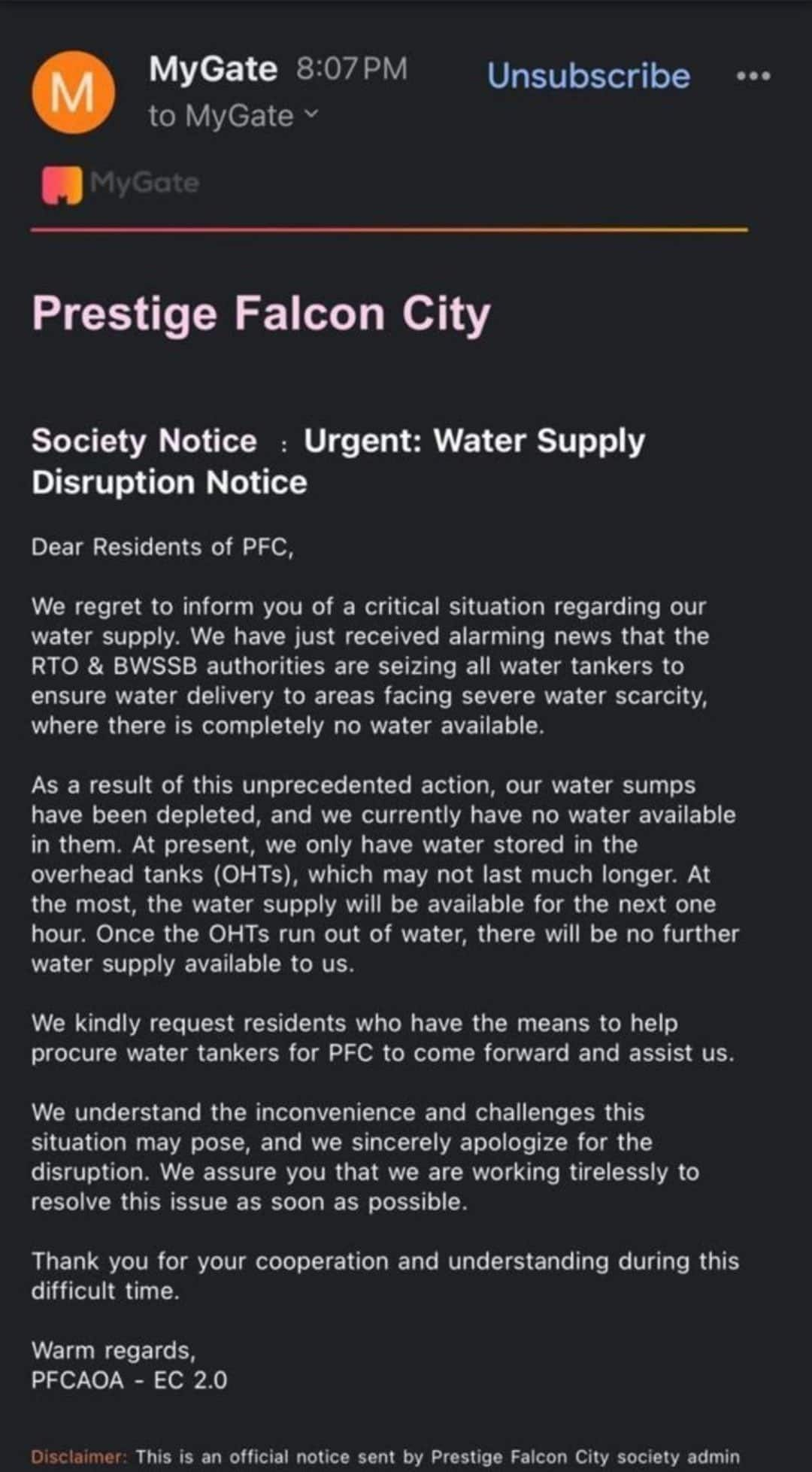



Gated communities in Bengaluru are now facing a water shortage after the state government began taking over private tankers.
Karnataka Deputy Chief Minister D K Shivakumar on March 2 announced that private water tankers in Bengaluru would be taken over by the state government due to severe water shortage in the city.
Joint Commissioner for Transport (Bengaluru Urban) M Shobha told Moneycontrol: "We have seized eight water tankers on Saturday and have handed them over to the Bangalore Water Supply and Sewerage Board (BWSSB)".
As a consequence, a situation has arisen wherein apartments that were directly with tankers now have to go through BWSSB.
In an internal message to residents, the Prestige Falcon City Apartment Owners Association (PFCAOA) on Kanakapura Road, which has 2,500 units, stated, "We regret to inform you of a critical situation regarding our water supply. We have just received alarming news that the RTO & BWSSB authorities are seizing all water tankers to ensure water delivery to areas facing severe water scarcity where there is no water available."

Further, it stated, "As a result of this unprecedented action, our water sumps have been depleted, and we currently have no water available in them. At present, we only have water stored in the overhead tanks (OHTs), which may not last much longer. At most, the water supply will be available for the next one hour. Once the OHTs run out of water, there will be no further water supply available to us."
BWSSB chairman Ram Prasath Manohar was unavailable for comment.
Also, read: Karnataka govt to take over private water tankers in Bengaluru: D K Shivakumar
Kiran Kumar, Joint Secretary of Changemakers of Kanakapura Road (CMKRA), said that getting water supply has become more complicated. “Now, with the government taking over these private tankers, it is more challenging as we need to approach local BWSSB officials, which is chaotic. At present, we directly deal with tankers, and now we need to deal with an official too. What the government should have done was to fix a tariff and regulate it instead of taking over.".
He said the tanker water mafia is guilty of monopolizing certain areas and fleecing residents to purchase drinking water at significantly higher prices.
Bruhat Bengaluru Mahanagara Palike (BBMP) Chief Commissioner Tushar Giri Nath said the state government has mandated the registration of water tankers in the city by March 7. "Vehicles unregistered after March 7 will be seized by the civic body and used to supply water to dry areas in 110 villages free of cost. We will also be fixing the maximum price for water tankers," he said.
Currently, there are around 3,500 tankers in the city, but only around 60 have received licenses from the corporation. BWSSB has only 68 tankers, which it is using to supply free water to residents.
RWAs ban car washing, shut swimming pools
Many Residents' Welfare Associations (RWAs) in the city have banned car washing and temporarily closed down swimming pools. DS Max Sandalwood Owners Welfare Association in Nagasandra has decided to immediately cease water washing of vehicles, and have limited swimming pool access to only weekends.
AP Kamath, a resident of Mantri Tranquil on Kanakapura Road, said, “We were allowing car wash only on Sundays, but now we are encouraging residents to opt for waterless car wash, which is more feasible.”
He added that they are not providing water between 12 noon and 5 pm and 11 pm and 5 am due to shortage and that they have shut their swimming pool for now.
Water shortage
Bengaluru is currently grappling with one of its most severe water crises even before the peak of summer. According to BWSSB, the situation is manageable in core areas but critical in the city's outer regions, especially near tech corridors where there is no piped supply of water from the Cauvery River.
As the groundwater table depletes and borewells run dry, apartment complexes, slum settlements, and commercial establishments in the 110 villages added to Bruhat Bengaluru Mahanagara Palike (BBMP) in 2008 are facing the worst impacts. Despite apartment complexes being willing to pay, private tankers claim they are unable to cope with the demand. The cost of private tanker water, usually Rs 400-600, has now risen to Rs 800-2,000 for a 12,000-litre tanker. Suppliers argue that the higher charges are tied to the need to source water from far-flung areas, as the drinking water sources within city limits have dried up.
Also, read: First floods, now dry days: Decoding tech hub Bengaluru’s water woes
Meanwhile, Tankerwala, a mobile app enabling users to book water tankers across Bengaluru and have them delivered to their apartments, is experiencing "100 times higher demand" than the general average. Shravanth Donthi, founder & CEO of Tankerwala, told Moneycontrol, "The demand has increased immensely. I received orders for at least 46 lakh litres daily on average for the last week, which is 100 times higher than average. The maximum demand we are getting is from Kanakapura Road, Nagawara, Jayanagar, Banashankari, Jakkur, Whitefield, Marathahalli, and KR Puram. The demand was less than half of this in February 2023."
"The water situation is extremely grim. We cannot get more water from the Cauvery River, and our groundwater table is overexploited. Continuing to extract more water from the ground is highly unsustainable,” said Donthi.

Discover the latest Business News, Sensex, and Nifty updates. Obtain Personal Finance insights, tax queries, and expert opinions on Moneycontrol or download the Moneycontrol App to stay updated!
Find the best of Al News in one place, specially curated for you every weekend.
Stay on top of the latest tech trends and biggest startup news.